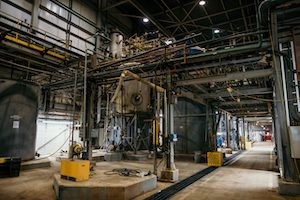Electra calls economics for Ontario EV battery plant ‘compelling’
Electra Battery Materials Corporation says it will proceed with further studies on the feasibility of building a fully integrated electric vehicle battery materials park in northern Ontario.
 The company recently released the findings of a scoping study for the project, the findings of which suggest that the project is economically viable.
The company recently released the findings of a scoping study for the project, the findings of which suggest that the project is economically viable.
The study assessed the economics and carbon footprint of various nickel feed options to develop an integrated facility producing 10,000 tonnes per annum of battery grade nickel sulfate and nickel equivalent precursor cathode active material – components that are essential to the production of electric vehicle batteries.
It found that capital costs to build such a facility and bring it into full production by 2025–26 would be in the range of US$500 million and US$650 million.
Operating costs on an integrated basis are anticipated to be between $125 and $133 million per year or between $13,000 and $13,600 per tonne of nickel sulfate produced excluding byproduct credits.
The production facility is expected to contribute $225 million of GDP impact during the construction phase, including $112 million of salaries and $35 million of taxes plus an additional $415 million during the first 10 years of operations, including $111 million of salaries and $78 million of taxes.
Electra estimates that 10,000 tonnes of per annum production of battery grade nickel sulfate and nickel equivalent pCAM could support domestic manufacturing of up to 250,000 fully electric vehicles per year.
"With U.S. electric vehicle manufacturers moving swiftly to reduce reliance on Chinese and Russian critical minerals in order to qualify for the $7,500 EV credit under the Inflation Reduction Act, Electra is capitalizing on the opportunity to provide secure domestic supply of EV battery materials," said Electra CEO Trent Mell. "The scoping study supports our view that an integrated refining-recycling-pCAM battery materials complex in Ontario would deliver compelling economics, emit low carbon emissions and address the onshoring of battery materials needed by the North American automotive industry."
"Backed by compelling project economics, we are now proceeding with an engineering prefeasibility study to narrow our focus on feed sources and devise a multi-phased approach to growing nickel refining capacity in North America."
Chinese refineries account for approximately 75 percent of battery grade nickel sulfate today.
"The benefits of an integrated recycling, refining, and pCAM facility identified by the scoping study provide a significant opportunity for Electra to further leverage its Ontario refinery location and assets," said Electra's VP of Engineering, Dave Marshall. "By using a phased approach towards project development and exploring collaboration opportunities for manganese and pCAM production, we will now look towards reducing capital and operating costs as we launch our engineering prefeasibility study."
In addition to the construction of a battery grade nickel sulfate refinery, the scoping study also examined the construction of an integrated pCAM manufacturing facility, which would receive nickel, cobalt and manganese in solution, thereby eliminating the capital and operating costs associated with refined product crystallization and handling. Electra has had discussions with several pCAM manufacturers and envisions that precursor production would be done by an existing producer seeking to establish a presence in North America.
Commissioning of a nickel sulfate refinery would allow Electra to treat battery black mass through to pCAM and return recycled material back to partner battery cell manufacturers, thereby creating an integrated EV battery supply chain loop.
Electra is pursuing a multi-phased approach to build an integrated battery materials park in Ontario. The first phase consists of commissioning a battery grade cobalt sulfate refinery in the spring of 2023, followed soon after with the commissioning of a battery recycling plant once a demonstration currently slated for the fall of 2022 is successfully completed. The third and fourth phases will consist of developing an integrated nickel sulphate refinery and pCAM manufacturing facility. Manganese refining is also under consideration.
With completion of the scoping study, Electra is now commencing a prefeasibility study to assess a phased approach to nickel refining while lowering initial capital and operating cost estimates.
Electra is targeting commercialization of an integrated nickel sulfate refinery and pCAM plant over the next three to four years following completion of requisite prefeasibility and feasibility studies and project construction.
The integrated nickel sulfate and pCAM facility is projected to have a 76,190 square metre footprint, all of which can be built on Electra's 600-acre land package in Temiskaming Shores, Ontario where the company is progressing with the commissioning of its cobalt sulfate refinery.
Construction is expected to create more than 2,500 job years’ worth of employment.








